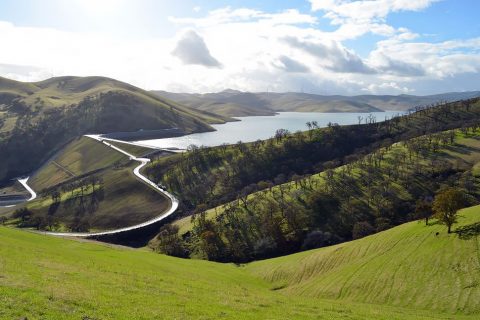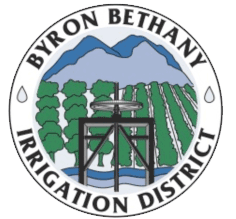The following news release was originally posted by the U.S. Bureau of Reclamation. Byron-Bethany Irrigation District (BBID) is a partner in the Los Vaqueros Reservoir Expansion Project.
SACRAMENTO, Calif. – The Bureau of Reclamation has released the Final Feasibility Report, which documents potential costs and benefits of the Los Vaqueros Reservoir Expansion Project. As part of a continuing effort to increase storage capability throughout California, Reclamation and the Contra Costa Water District worked together on Phase 2 of the project to increase the capacity from 160,000 acre-feet up to 275,000 acre-feet and adding new conveyance facilities.
 In October 2018, President Trump issued the Memorandum on Promoting the Reliable Supply and Delivery of Water in the West. Reclamation, together with its partners, is acting on that call and taking action to improve water supply reliability throughout the state.
In October 2018, President Trump issued the Memorandum on Promoting the Reliable Supply and Delivery of Water in the West. Reclamation, together with its partners, is acting on that call and taking action to improve water supply reliability throughout the state.
“We are pleased to partner with CCWD on this smart expansion project that would create additional storage capacity in an existing footprint,” said Commissioner Brenda Burman. “This is a win-win for the Bay Area and the Central Valley Project.”
This expansion could provide increased water supply reliability and operational flexibility to the Central Valley Project. In addition, the expansion would deliver water supplies to various Bay Area municipal and industrial water providers, as well as federally-recognized wildlife refuge areas and irrigation districts in the San Joaquin Valley.
“This is a significant milestone for the Los Vaqueros Reservoir Expansion Project and project partners,” said CCWD Board President Lisa Borba. “We are grateful for our partnership with Reclamation as we move forward to make this important investment in water storage a reality.”
“As a potential beneficiary of the expanded storage and improved conveyance facilities, the Del Puerto Water District commends both Reclamation and CCWD’s efforts to bring LVRE to this important milestone, said Del Puerto Water District General Manager Anthea Hansen. Water infrastructure, especially expanded storage capacity and improved connectivity between different regions of our state, are foremost on the minds of water managers in California. I am truly impressed with the excellent work of the CCWD team and look forward to hopefully being a part of this much-needed project, not only for my region but for the health and prosperity of our wonderful state.”
The LVE is a joint investigation between Reclamation and CCWD authorized by Congress in 2003. The objectives of the expansion are to develop water supplies for environmental water management, increase water supply reliability for water providers within the San Francisco Bay Area, and improve the quality of water deliveries to municipal and industrial customers. The Final Feasibility Report was transmitted to Congress on August 11.
The Final Feasibility Report is available on Reclamation’s website at https://www.usbr.gov/mp/vaqueros/.
